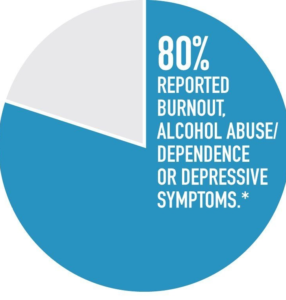MEDICAL STUDENTS BURNOUT

Burnout is a measure of professional distress with three domains: Emotional exhaustion, depersonalization, and low sense of personal accomplishment. Burnout in medical school is one of the most common feelings that medical students face. There is so much to learn, in what seems like very little time, that every day can be overwhelming. It is also very easy to lose yourself as a medical student because you don’t take the time to do the things you enjoy.
How Medical Student Burnout Affects the School:
The side effects of medical student burnout can quickly have an impact on the school and community at large. When students are experiencing high levels of cynicism and physical exhaustion, the learning environment suffers. If students are not receiving help with their burnout symptoms, it’s likely the negative attitudes will rub off on first-year med students. Similar to a cynical work environment, burnout can breed rapidly within a school in which students live, go to class, and study together. If students are pushed too far, they will eventually look for a different career path. Decreases in graduation and attendance rates are not attractive to potential medical students, making it even harder for the institution and community to yield successful physicians.

How Medical Student Burnout Affects
medical students are more likely to succumb to substance abuse than people of similar demographics who are not in medical school. Specifically, one study reported that nearly 33 percent of medical students claimed the symptoms of alcohol abuse; just 16 percent of their non-med peers face the same problem. Medical student burnout appears in other symptoms such as depression, anxiety, sleeplessness, headaches, gastrointestinal issues, and poor concentration. Consuming more alcohol, developing a cynical outlook on life, and withdrawing socially are all ways medical students respond to burnout in their personal lives. Students may even act out disruptively and affect both their classmates and personal relationships. If burnout impacts a medical student’s personal life enough, they can turn to a new career path completely.
Symptoms of Medical Student Burnout:
Exhaustion
Extreme tiredness is one of the most apparent symptoms of burnout in medical students. Intense study and class schedules can easily result in burnout-related exhaustion. It’s crucial for students to get the right amount of sleep to be able to perform everyday tasks and retain information.
Emotional detachment
If a once passionate and positive medical student is now seeming desensitized and cynical, he or she could be experiencing burnout. This is detrimental to the student’s personal relationships and future career if left unaddressed.
Feeling incompetent or useless
Medical students could be fighting burnout if they begin to feel completely incompetent or useless in school and their personal life. A hopeless or cynical attitude can be a sign that a student is feeling they are not smart or good enough to take on their current responsibilities.
Feelings of alienation
Many times, medical students take on such a heavy workload that they become burned out and feel no one else understands what they’re experiencing. It is important to promote community within the school, as to prevent students from feeling alone in their struggles.
Causes of Medical Student Burnout:
Competing time demands
Medical school oftentimes consumes the majority of a student’s time. Feeling the pressures of a strict study schedule can result in a medical student missing out on important social or family events. Relationships can become strained and even broken if a med student isn’t encouraged to find a more flexible schedule.
Strained finances
Many medical students take on student loans to pay for tuition. It can be stressful to have debt looming overhead when most students don’t have time to get a job while in school. Extra spending money can be tight as well, due to any living expenses acquired during school.
The “hidden curriculum”
When medical students are delegated only menial tasks by superiors, passion for the field can quickly dwindle. Moreover, by acting indifferent about others’ feelings, students might get the impression that being a physician is a compassionless and apathetic career path. These aspects of medical school are known as the “hidden curriculum.”
Unattainable expectations
Expectations from parents, professors, and even themselves can cause medical students to feel inadequate or incompetent. Feelings of deficiency can drive a student to internalize his or her burnout symptoms even further, not wanting to express any vulnerability.
No incentive for the well-being
Medical students are being told to “take care of themselves,” but have no incentives to reach out for help. Administrations who are serious about unearthing and treating burnout in medical students need to have an accurate method of assessment for each individual. The institution should also find value in students routinely reassessing to ensure wellness initiatives are effective. The future of healthcare lies in the minds of our medical students.

Written by: Rhythm Agrawal
4th-year Mbbs student, faculty of Medicine,
Avicenna international medical university, Bishkek, Kyrgyzstan.
CLICK HERE TO READ OUR ISSUES OF THE MAGAZINE
CLICK HERE TO READ OUR ISSUES OF THE NEWSLETTER
